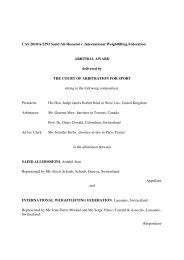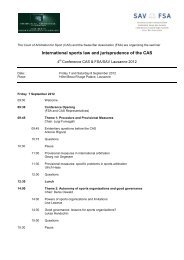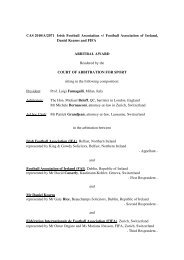(CAS) Bulletin - Tribunal Arbitral du Sport / TAS
(CAS) Bulletin - Tribunal Arbitral du Sport / TAS
(CAS) Bulletin - Tribunal Arbitral du Sport / TAS
Create successful ePaper yourself
Turn your PDF publications into a flip-book with our unique Google optimized e-Paper software.
analytical fi nding, i.e. as alternative explanation for<br />
the presence of clenbuterol in the Athlete’s system<br />
compared to the meat contamination scenario relied<br />
on by him.<br />
In other words, the Appellants did not initiate the<br />
disciplinary proceedings on the grounds of an alleged<br />
blood transfusion.<br />
In his submissions, the Athlete has criticized the<br />
foregoing fact – i.e. the lack of direct correlation<br />
between the charge brought and the facts invoked<br />
to evidence the existence of an anti-doping violation<br />
- and has shown obfuscation in that connection,<br />
arguing that such approach of the anti-doping<br />
authorities is unacceptable.<br />
The Panel is of the opinion that the foregoing<br />
criticism is incorrect.<br />
As explained above, the Appellants could not in the<br />
case at hand simply contest the contaminated meat<br />
scenario, but – <strong>du</strong>e to their obligation to cooperate<br />
in elucidating the facts - had to substantiate their<br />
contestation, i.e. they were bound to give an<br />
explanation as to why they thought the contaminated<br />
meat scenario was untrue and why they believed such<br />
scenario to be impossible or at least less likely than<br />
other alternative scenarios.<br />
In view of this obligation to cooperate in establishing<br />
the facts of the case and considering that neither<br />
the applicable rules nor principles of fairness<br />
dictate otherwise, the Panel fi nds that – subject to<br />
the comments below concerning their proce<strong>du</strong>ral<br />
approach - the Appellants cannot be criticized for<br />
invoking and defending their alternative scenarios,<br />
including the blood transfusion theory. However,<br />
the Panel notes, in weighing the evidence before<br />
it, that neither UCI nor WADA were apparently<br />
confi dent enough to bring a doping charge against<br />
the Athlete based directly on their allegation of a<br />
blood transfusion.<br />
To sum up, for the above reasons, the Panel fi nds that<br />
although the blood transfusion theory is a possible<br />
explanation for the adverse analytical fi nding, in light<br />
of all the evidence ad<strong>du</strong>ced and as explained above, it<br />
is very unlikely to have occurred.<br />
The Panel has thus concluded that both the meat<br />
contamination scenario and the blood transfusion<br />
scenario are – in principle - possible explanations<br />
for the adverse analytical fi ndings, but are however<br />
equally unlikely. In the Panel’s opinion there is no<br />
need to further investigate the relationship between<br />
the two foregoing scenarios since, as will be<br />
detailed below, the third scenario (the contaminated<br />
supplements scenario) is not only possible, but the<br />
more likely of the three.<br />
6. The Supplement scenario<br />
Submissions by the Parties<br />
According to WADA, another plausible scenario<br />
is that the adverse analytical fi nding results from a<br />
contamination through a food supplement.<br />
The existence of contaminated food supplements in<br />
general is uncontested and there are numerous cases<br />
of athletes who have tested positive after having<br />
ingested contaminated food supplements.<br />
WADA points out that such food supplement<br />
contaminations have also involved clenbuterol and<br />
in that connection it invokes as an example the <strong>CAS</strong><br />
2009/A/1870 case, which was adjudicated by the<br />
<strong>CAS</strong>.<br />
In the <strong>CAS</strong> 2009/A/1870 case, the athlete tested<br />
positive for clenbuterol, like Mr Contador. After<br />
being informed of her positive result, she had the<br />
food supplements she was regularly taking tested<br />
by a laboratory. The analysis showed that those<br />
supplements were tainted with clenbuterol. The<br />
contaminated supplement was supplied by AdvoCare,<br />
an established health and wellness company, which<br />
endorses hundreds of top-level American athletes<br />
like Ms <strong>CAS</strong> 2009/A/1870.<br />
This case illustrates – according to the Appellants -<br />
that it is possible for an athlete to test positive for<br />
clenbuterol because of a contaminated supplement<br />
even if the pro<strong>du</strong>ct is purchased over the counter<br />
from an apparently reliable source. Furthermore,<br />
this case shows that the substance involved here, i.e.<br />
clenbuterol, is precisely one that can be found in food<br />
supplements.<br />
Mr Contador contested these allegations by<br />
submitting that he only used the food supplements<br />
of the Astana team. In that connection, Mr Contador<br />
provided a list of the food supplements used by the<br />
Astana team <strong>du</strong>ring the 2010 Tour de France. This<br />
list was drawn up by Mr José Marti, assistant coach,<br />
and Mr Valentin Dorronsoro, chief masseur, of the<br />
Astana team. In a statement dated 9 November 2010,<br />
Mr Marti Marti and Mr Dorronsoro confi rmed that<br />
Mr Contador used these food supplements.<br />
According to WADA, Mr Contador’s allegation is not<br />
verifi able and no analysis has been provided to show<br />
that these supplements could not be contaminated.<br />
Jurisprudence majeure / Leading cases<br />
-<br />
137





